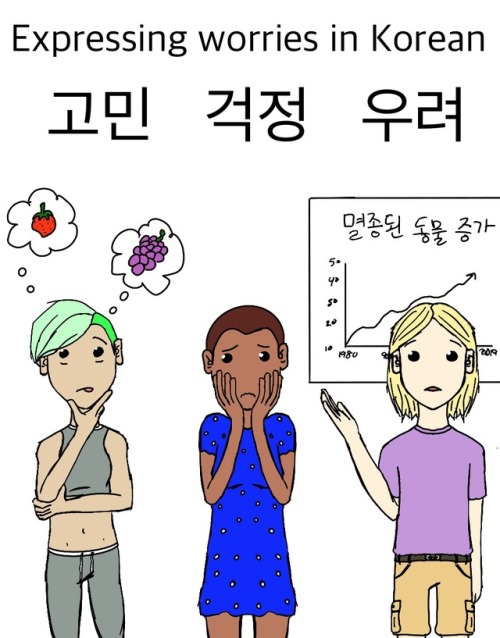Hi guys! Today’s post is about worries–more specifically three words that get translated to “w
Hi guys! Today’s post is about worries–more specifically three words that get translated to “worry” but are not the same. 고민 and 걱정 are two words that always confuse beginner Korean learners and even intermediate students.고민 is a worry or trouble, but it’s typically used when you’re trying to make a decision. When you need to make a decision, you tend to worry about it, right? It’s also typically a decision that you can’t make right away, so it might cause you discomfort, which is why it’s translated to “a trouble.” It gets used in serious situations or lightly, like when choosing what to eat or wear. Like the picture, 딸기를 먹을까 포도를 먹을까…고민되네. Should I eat some strawberries? or should I eat some grapes? I’ve gotta think about it.I typically translate 고민되다 to “thinking about” something in light situations because that’s what is happening. English would not typically use the word “worry” when deciding what fruit to eat (at least in my experience).걱정 on the other hand is a bit more serious than 고민. It’s normally something that’s causing discomfort or panic in some sense (severe or not). I think it’s more in line with the English definition of “worry.”Like the worried girl in the picture, 연락이 안 돼서 걱정했잖아! I was worried because you didn’t answer my message(s). (연락이 안 되다 - to not be able to get in touch/contact with someone)So, if you are worried about not being accepted into college, that’s a 걱정. If you’re trying to decide which college to go to, that’s a 고민.Usage:Both 고민 and 걱정 can be used with the verbs 하다 and 되다.고민/걱정하다 is used to refer to something that you are actively thinking/worrying about. It’s also used in active constructions like 해야 하다 “have to” or 하지 마 “don’t” do something.고민/걱정되다 is used to refer to more passive worries or something that is worrisome, but usually not keeping you up at night. They can also both be used as nouns(고민이다/걱정이다) to say “this is a worry.”*Note the following are not direct translations. (I usually try to balance them, but I decided to go with mostly natural translations for this to demonstrate their differences.)뭐 먹을까? 고민되네. What should we eat? Gotta think about it…고민하지 말고 결정해! Don’t think/worry about it and just decide.내일 도서관에 갈까 말까 고민이야. I’m thinking about whether I should go to the library tomorrow or not. 그 여자랑 사귈까 말까 많이 고민했는데…안 만나는 것이 나을 것 같아요. I considered(thought about) whether I should date her or not a lot…and I think it would be better not to meet her. —————————————————————오늘도 많이 안 먹었어? 걱정되네. 무슨 일 있어? You didn’t eat a lot today either? That’s worrisome. (I’m getting worried) Is anything going on?어제 연락이 없어 가지고 걱정했거든! 무슨 일 생긴 줄 알았어. I didn’t hear from you yesterday, so I worried, you know! I thought something happened.걱정하지 마. 괜찮을 거 야. Don’t worry. It will be okay.우려 is our last “worry.” Luckily, you don’t have to worry about 우려 too much, because it’s quite advanced, but I wanted to add it to balance these words. 우려 means “worry,” but it’s used in formal situations (presentations, news etc). It’s often used as 우려가 되다/우려가 있다 and 우려의 목소리가 크다/우려하는 목소리가 크다 (the voices of worry are big/the voices expressing worry are big –which means that a lot of people have expressed being worried about a certain topic).Like in the picture, someone is giving a presentation with the title “멸종된 동물 증가” (extinct animals increase). He would probably use the word 우려 during his presentation instead of 걱정. Here are some examples, but please don’t worry if they’re hard to read. These are the kinds of sentences that might be seen in news papers. 과학자들이 지구 온난화에 대한 우려의 목소리를 내고 있다. Scientists are voicing their concerns about global warming. 물가 상승이 우려된다. The rising cost of living is worrisome.물가가 계속 올라가서 시민들이 우려하고 있다. Citizens are worried because the cost of living keeps going up. I hope you guys are having a nice weekend without any worries. Follow me for more Korean lessons and tips! -- source link
Tumblr Blog : milkcocoahkorean.tumblr.com
#korean#learn korean#study korean#한국어 배우기#한국어 공부#한국어공부#한국어공부중#한국어#한국말#한국어 어휘#한국어 단어#걱정#우려#고민#korean language#korean vocabulary#kdrama#langblr

